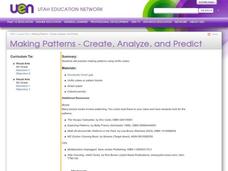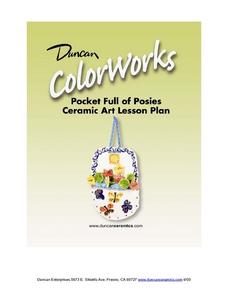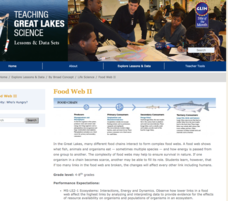Curated OER
Making Patterns - Create, Analyze, and Predict
Fourth graders practice making patterns using Unifix cubes and identify, analyze, and determine rules for describing numerical patterns involving operations and nonnumerical growing patterns. They also find an example of a pattern in...
Curated OER
Changing Energy: Landforms and Dance
Third graders choreograph a dance to represent the changes in nature. For this dance and nature lesson plan, 3rd graders use sharp quick movements to demonstrate changes.
Curated OER
Life Cycle of Trees
Turn your students into young tree-tectives with this fun science investigation into the life of trees. To begin, a class volunteer gets dressed up in a tree costume as the different parts of trees are introduced. Then, the class learns...
Curated OER
Pocket Full of Posies: Ceramics
After studying the plant or flower life cycle, have the class create a basket of flowers out of clay. They hone their ceramics skills while they push, pull, then paint clay to look like flowers they've seen in nature. There are several...
K12 Reader
From Nomad to Farmer
The gradual evolution of the earliest settlers in North America from nomads to farmers is the subject of a reading comprehension instructional activity that asks kids to answer a series of questions using information provided in the...
Curated OER
The Poinsettia: Native Mexican Plant vs. U.S. Christmas
Students compare and contrast native Mexican poinsettia plants to those marketed in the United States. They watch a PowerPoint presentation, and listen to a version of the legend of the poinsettia. Students then create a paper pinwheel...
Illustrative Mathematics
The Djinni’s Offer
The djinni in this resource offers gold coins. Learners use the properties of exponents to make their decision as one offer increases exponentially. This makes a great group project. As the commentary suggests, start by having groups...
Michigan Sea Grant
Food Web II
A food web consists of complex food chains and the more complex the web, the better likelihood of survival. Learners compare and contrast food webs and food chains and discuss concepts like the predator-prey and consumer-producer...
Curated OER
How Trees Contribute to the Water Cycle
For this water cycle instructional activity, 3rd graders conduct an experiment where they observe and calculate how water transpires in different types of trees. Students engage in a class discussion and use Venn Diagrams to compare...
Curated OER
Animals Finding Rice Paddies
Fourth graders examine the animals who live in rice paddies and create a chart. In this rice lesson, 4th graders link the types of animals living in each ecosystem with a bar graph. Students use colored bars to show animals that live in...
Curated OER
Build a 3-d Plant Model
Third graders construct a three-dimensional model of a flowering plant. They examine the major plant parts and their basic functions. They demonstrate an understanding of the similarities and differences in the physical...
Curated OER
Rainfall Mapping
Students explore rainfall and habitats. In this rainfall lesson, students explore the relationships among rainfall, vegetation, and animal habitats. Resources are provided.
Curated OER
Flower Power
Young scholars explore the parts of flowers and how they reproduce. They dissect flowers and observe the reproductive organs. Students observe anthers and ovaries of Tiger Lilies under a microscope. They investigate how insects and...
Curated OER
Eggs'ceptional Experiments
Students see evidence of chemical reaction and follow the scientific method to hypothesize, observe, and reach conclusions. They conduct a series of egg based experiments such as forming crystals and complete journal activities as a...















